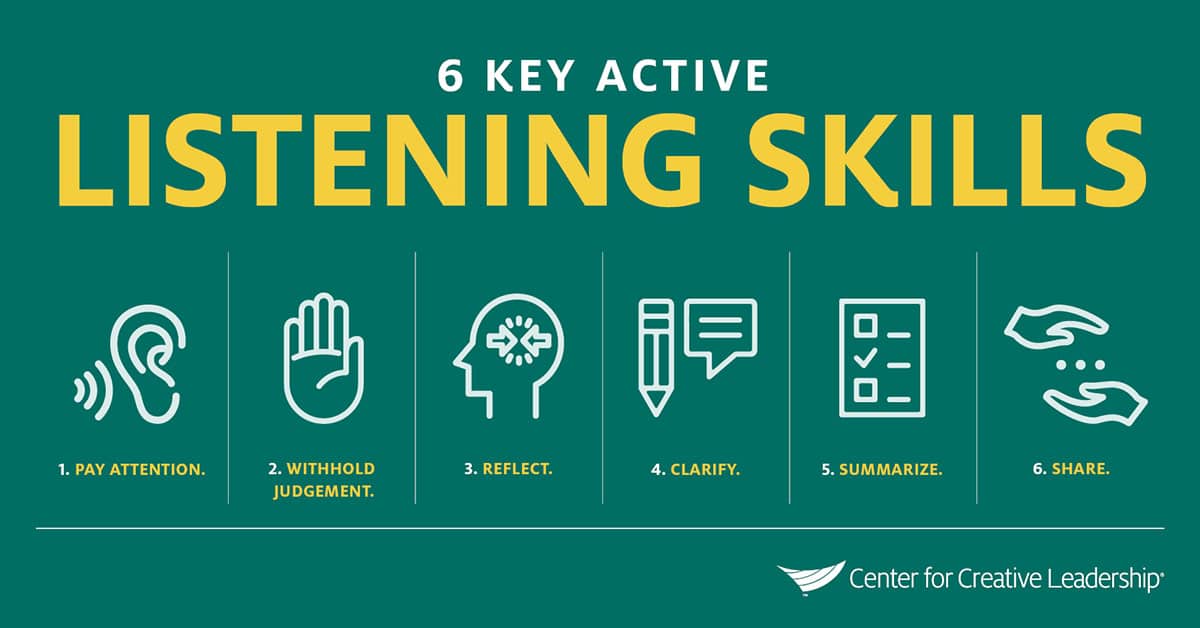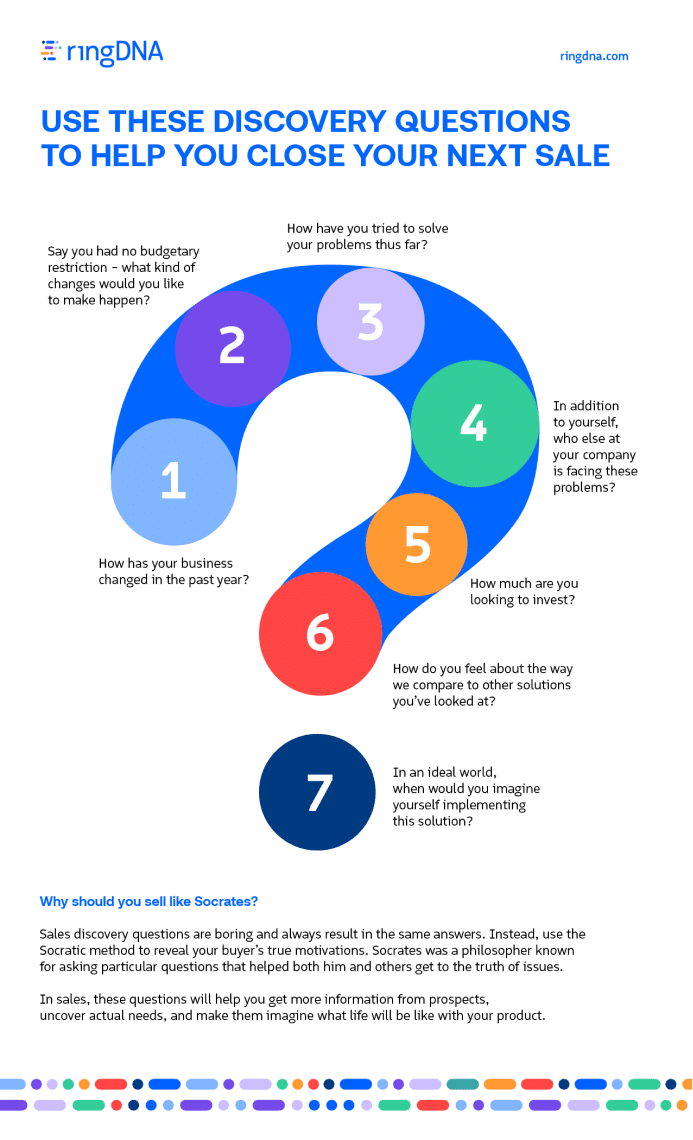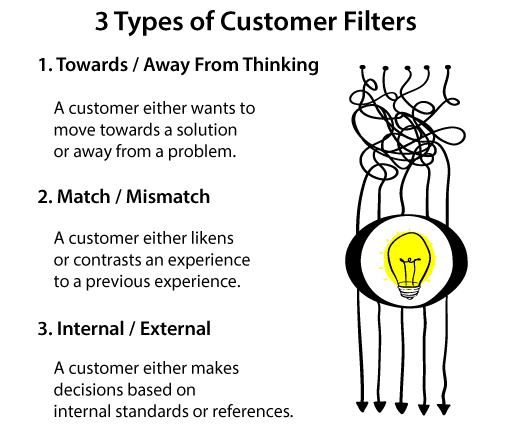Connecting with your leads and ensuring you align the right solutions with their needs, is all about asking the right questions at the right time. Without asking questions, you will be in the dark about your prospects' needs and you could risk offering solutions that they really don’t need or care about.
But simply asking questions isn't enough. There is an art to asking strategic sales questions at the right time in the sales cycle that can help sales professionals connect with prospects and close the deal.
Why You Should Ask B2B Prospects Questions
It’s no secret that sales is a very personal and relationship-based experience for both sales representatives and prospects or customers alike – not only in B2C but also in B2B. When starting interactions with customers, it’s important to ask the right sales questions.
Often, questions are a natural part of the conversation flow, but have you ever glossed over the answers? It’s important to listen to the answers your customers and prospects are giving you; it can reveal a lot. There are two great strategies that sales professionals can use when asking prospects sales questions that could help close more deals.
Practice Active Listening
Active listening is a technique where you will carefully listen and observe the non-verbal cues or vocal inflections. While practicing active listening, you’ll provide feedback through paraphrasing. You will often see this type of listening in counseling, training, or through solving disputes or conflicts, but this is a great technique to use with prospects as well. Active listening shows your potential customer that you are listening to them and that you understand their needs.

Source: www.ccl.org
Practice Solution Selling
Solution selling is a type of selling that requires a sales representative or team to follow a sales process that is problem-led instead of product- or service-led. This approach allows sales professionals to listen to the needs of the customer and determine which products or services will solve their problem instead of simply pitching an entire portfolio. Highlighting how the product or service can specifically solve the customer’s problem, is one of the best ways to show you are listening to your customer and providing solutions instead of just generic sales pitches.
Additionally, when working with customers, all of your sales questions should be open-ended, meaning that they require more than a “yes” or “no” answer. Asking “yes” or “no” questions will not provide you enough context as you create a pitch or package!
The Perfect Questions to Ask During a B2B Discovery Call
During a discovery call, it’s a sales representative's job to start building a trusting relationship with a prospect and to collect all the valuable information that can help craft the perfect sales pitch.
Do not make the mistake of diving right into a demo of a product or solution without first understanding your customer’s needs and business. Not only will this result in a broad demo that doesn’t actually solve any problems, but it could waste your prospect’s valuable time, hurting their trust in you.
Additionally, it’ll save yourself precious time: when a company does not fit your product or vice versa, it’s best to politely end the relationship with that prospect for that specific solution.
Questions to Ask to Help Understand Your Prospect’s Challenges
Understanding your prospect’s challenges allows you to be their helpful guide through your products and services. These questions will help you understand your prospect’s current business and the obstacles they are facing as they are working towards their goals.
1. Could you tell me about your current business?
Starting off, you need to understand their current business. Although it’s always best practice to do your research ahead of time, it’s great to hear how the business actually operates and the language that your prospect uses to describe their business.
Pay attention to the words that the prospect uses while they are answering this question, and what information they omit. This question is a non-threatening way to start your conversations and will eventually allow you to ask questions that get down to the root cause of their problems.
2. What goals are you working towards this quarter? This year?
A follow-up or bonus question you could ask that would help you get even more information from your prospect is:
2a. Who in the business is responsible for delivering on these specific goals?
This will give you insight into who some of the decision-makers could be. You can also keep these personas in mind when you are presenting your solutions later on.
3. What challenges are you facing as you are working towards these goals?
What’s more, asking follow-up questions about these obstacles will help you paint a full picture of your prospect’s business and allow you to start developing plans for how you will position your product or solution.

Source: www.ringdna.com
4. How do these challenges impact your business?
Not only is it important to understand the challenges that leaves your prospect sleepless, but it’s equally as important to understand how these obstacles will impact them and the business. This question shifts the conversation away from the problem (rational and logical business issue), and towards the impact (the emotional and personal impact).
When understanding the impact, a sales representative is able to grasp the bigger picture and tap into the emotional side of the business. Emotions are a key influencer in almost all purchasing decisions.
Questions to Ask to Understand Your Prospect’s Interest and Priorities
It’s a great practice to understand your prospect's interest, priorities and expectations. During this phase you can tap into why they came across your solution, what they currently know or don’t know, and what changes they are looking to make to their business.
These questions should give you a deeper view into your prospect’s problems and expectations so you can conduct a product demo that’s valuable to them, with confidence.
5. You specialize in X. Why did you choose that target market or customer base?
This question is great because not only will you learn more about your prospect’s business, you’ll also learn about their target customers and priorities. This can give sales professionals an inside look into how their prospects think and potentially position their own products.
Not only will these questions allow sales representatives to get a deeper understanding of their prospects' business and help build a relationship, but this question also allows them to think about which product or solution might work best. When developing the sales pitch, sales professionals can tailor their language around what would resonate well with their prospect’s customers and niche.
6. What is the business problem you are trying to solve?
There’s a reason you are talking to your prospect. Now that you have an understanding of their business and their target customer, it’s time to start understanding the specific problems they are trying to solve. Are they struggling to find high-quality leads? Is there a new market or geography that they are trying to break into?
This can give you the upper hand when you move onto the product demo phase as you can pull customer stories or testimonials that match your prospect’s problems. It’s customary to talk about how great your solution is, but when you are able to share a story from a customer that’s like them (a similar use case), it can help reinforce your message.
Note: If you're talking to a prospect in the FinTech sector while you've already got two satisfied customers working in the same field, you're in pole-position! Use existing marketing material from these customers, like a success story, an interview or a video to overcome any concerns from your new prospect!
7. What prompted you to explore our solution for your business?
There’s a reason that you are having a conversation with this prospect and typically it’s because you received their information from your marketing team’s lead generation strategy. Unless you’ve been conducting cold calls, you already know that your prospect is at least somewhat familiar with or interested in your solution.
Understanding what attracted them to your product or service will help you highlight the features and layer on additional benefits that are similar to what initially sparked their interest. This will also allow you to tailor your product demo around the features that attracted them to your company in the first place.
8. If you could snap your fingers and have the perfect solution for your business, what would that look like?
Sometimes, you need to assume that your prospect has looked at multiple solutions and has a pretty good idea of what they want a solution to do for their business. This question allows you to understand their expectations without blatantly asking what their expectations are.
With the answers to this question, you can ensure that you are touching on their “must-haves” during the product demo. If there are certain solutions that they mention that your product doesn’t currently offer, think of other features that could meet their needs that they didn’t specifically mention. Understanding expectations during the discovery call will allow you to create a demo that will resonate with your prospect.
The Perfect Questions to Ask During a Product Demo
After you’ve finished the discovery call, it’s time to start planning your product demo. The best thing to do is utilize the answers you collected during the discovery call to develop a product demo that touches on the information your customer gave you.
However, the sales questions don’t end at the discovery call phase: as a sales representative, you need to continue to ask questions during the product demo phase, too.

Source: www.callcentrehelper.com
9. After viewing this solution, how do you think this will help you overcome [insert prospect’s problem]?
This question not only allows you to show your prospect that you were listening to their challenges and trying to solve them, but if the solution isn’t fitting their expectations, it allows you to adjust the demo and show some other solutions and features.
This could also allow your prospect to mention another challenge that their business is facing that your product could solve for. Ultimately, allowing your potential customer to see the solution in action for their specific business can be a huge influencer in closing the deal.
10. Who else in your organization could benefit from this product?
When investing in a great solution, a business wants to know how it can adapt to the different needs of the business. For example, if a sales solution can help with prospecting, there could be a great use case for marketing teams to utilize the solution for lead scoring or lead qualification.
When you can show the extended value of the solution, the probability of it being adopted by your prospect are high. Suggest hosting product demos with other departments that could benefit from the solution. Having additional decision makers view your solution in action, can highlight the deep value it could bring to their business.
Another great selling point to mention is the onboarding and training solutions your company offers and how that can benefit different departments.
11. What other tools do you use on a regular basis?
This question is great to ask during a demo to understand what tools work well for their business. For example, if they are using a productivity tool to manage their products or a CRM to track their customer data and engagement, you can talk about how your solution integrates with their current processes.
Your prospect is looking for a tool that makes their lives easier and with tools that integrate, that saves them time from switching between systems. If your solution doesn’t integrate, think about how you can bring this up with development teams because this could potentially be a selling point for many prospects.
12. Was there anything else you’d like me to go over that I didn’t cover today?
This is a question that often gets overlooked by sales professionals. During a demo, a sales representative's job is to ensure that you offer a valuable solution to their current business problem. Asking this question will allow you to understand if there is anything you missed.
If your prospect does want to see additional features, use this time to walk them through those solutions. And, if you are close to running over time during the scheduled demo meeting, don’t be afraid to go over. However, ask your prospect if they’d prefer to spend a little extra time during this demo or if they would like to schedule another one. Remember to always be considerate of your prospect’s time.

Source: www.gong.io
Questions to Ask to Help Close the Deal
After you’ve spent time learning your prospect’s needs and giving them a tailored and in-depth demo, now is the time to talk about closing the deal. During this stage, it’s best to understand what other decision-makers need to be involved, if there are budget considerations or if your prospect has any hesitations that need to be addressed.
Use the information (both through verbal and non-verbal cues) you collected during the discovery call and product demo to create a great closing sales pitch. Was there a feature that wowed your prospect? Make sure you mention that and reinforce the benefit to their business. Was there a concern that came up? Address that, too, and help minimize that concern by highlighting how your product or solution will actually make their lives easier and help them achieve their business goals.
13. What is your timeline for implementation?
As you are getting towards the end of your interactions with your prospect, this question will allow you to understand their current timeline. If they are still browsing other solutions, or if they are still unsure about how your solution will solve their business problem, it might be a good idea to find additional resources to reinforce why your solution will work best for them.
This is also a great time to understand what external factors might be influencing their implementation. Are they waiting for a new quarter? Are they currently onboarding staff that will use this solution? Are people who are part of the decision-making team out of the office? The more information you have about their timeline, the better you can plan your follow-ups.
14. Is there anyone else on your team I should speak to?
For example, are you going to be speaking to someone in the legal department who needs a view inside of their customer’s agreements and contracts? You might want to focus your solution on visibility. Or, will you be meeting with sales managers who need visibility into forecasting or their sales team’s performance? Understanding what these different teams will use the solution for will allow you to focus your demo or pitch on those differentiators.
15. Does this solution fit within your budget?
It’s always best to understand your prospect’s budget. If there are concerns about price, a great sales representative will be able to highlight how the solution can actually make their teams more efficient, which could result in more revenue.
But, if budget is a huge concern, there could be certain deals or packages that you are able to offer. This is when sales teams need to work closely with legal and accounting teams to determine the best pricing structure and packages that will allow them to close the deal but to also give your prospect a solution that works within their budget. Getting your prospect invested in your solution, even if it’s at a foundational level, can allow you to upsell in the future.
Conclusion: Asking the Right Sales Questions Can Help You Increase Your Revenue
Questions will keep your prospects talking, allowing sales professionals to create the perfect pitch or demo, resulting in a closed deal and a happy customer. The sales representative’s job is to understand how the product or service can help solve the prospect’s problems and help meet their needs and goals.
To do that, you need to ask the right questions at the right time. This process should feel natural to both the prospect and the sales representative. Remember this isn’t an interview, this is a relationship-building exercise, where the goal is to offer the best solution, tailored to solving the prospect’s challenges.
Do not underestimate the power of a good question and use these tactics in your next sales calls to build a strong relationship with your prospect and close the deal faster.
